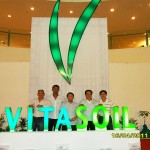bl21 sonication protocoloversized entry door hardware
23. - incubate some hours at "20. Find books . Take OD 600 before cfg ; Resuspend to an OD 600 of known amount or 10 ml /bottle of "buffer B" pH 8 (lysozyme is more efficient at pH 8.) Preparation for Transformation. Whereas in the study of Kwon and Jewett the required sonication energy input depended just on the cell suspension volume, we observed different optima for different culture methods, e. g., S5 L0.5 for shaking flask and S16 L0.5 for bioreactor cultivation. applies to strains BL21, BL21(DE3), and BL21(DE3)pLysS included in this kit and any derivatives you may make of them. Adapted from Kwon and Jewett 2015. Centrifuge cells to pellet them (~5 minutes). Production of cell-free lysate from E. coli BL21 Star (DE3) with optional induction of T7 RNAP. Features: Variable starting culture sizes (10 mL - 1 L) Constant energy sonication S12 centrifugation Run-off and optional dialysis Protocol successfully used at the University of Edinburgh by Nadanai Laohakunakorn, Transformation is performed by heat shock at 42 C, followed by incubation on ice. Resuspend cells in a lysis buffer, usually containing PMSF (phenylmethylsulfonyl fluoride), a serine protease inhibitor which helps prevent the degradation of your exposed proteins. Normally you would be able to find this at every instruction manual of any . extent of sonication for optimal yields of intact fusion protein must be determined empirically. It is of great importance because it offers several promising health effects. Small-scale Expression and Solubility Testing of Proteins in BL21 E. coli. (Feb/07/2007 ) I need to disrupt 200 ml of E. coli BL21 culture. 24. (For C2527I) Thaw a tube of BL21 (DE3) Competent E. coli cells on ice until the last ice crystals disappear. Plate on antibiotic selection plates and incubate overnight at 37C. However, following these sonication protocols for cell lysis, the resulting CFPS extract produced protein at . Protocol. For me the correct answer would be: The minimum amplitude you need to break the membrane with no overheating your sample. These contents are then separated out of the mixed sample . Typically, for 25 ml-lysates of non-fused GST, 3 to 5 Step 1: Transform appropriate DNA plasmid into BL21 (DE3) E. coli cells. Sonication Protocol for Protein Extraction. Protocols for the Preparation of E. Coli Lysates Expression analysis and purification of recombinant protein. Get your cells into lysis buffer. In this step, electrocompetent E. coli BL21 / pG-Tf2 are prepared which will be used to co-express the RdRp complex in E. coli with the aid of chaperone proteins from the pG-Tf2 plasmid.. Before starting: Autoclave the following items: 2 L dH 2 O split into 2 flasks, 100 mL of 10% (v/v) glycerol, 4 250 mL centrifuge bottles and caps, 1.5 mL microcentrifuge tubes, 250 mL graduated cylinder . (His10)-tagged proteins, E. coli BL21(DE3) was . To obtain information about licensing, please contact the Office of Intellectual Property and Industrial Partnerships, Brookhaven National Laboratory, Building 475D, Upton, NY 11973 [telephone: 631-344-7134; Fax: 631-344-3729]. Lysis Protocol for E. Coli. Rapid and high-throughput protein purification methods are required to explore structure and function of several uncharacterized proteins. While the column is flowing, prepare a rack of 10 microcentrifuge tubes labeled 1-10. and detergent Detergent: 40 mM octyglucodis (may cause aggregate in some mutannts or 0.1% triton X-100 ASR uses) Collect ~0.5-ml fractions of the eluate in each microcentrifuge tube. Add lysozyme and incubate on ice for 30 minutes, at 30 C for 15 minutes or until the mixture becomes very viscous. When cell lysis is successful, the undamaged contents of the cell escape through the damaged cell membrane. Ubiquitin and Protein Degradation, Part A | Raymond J. Deshaies (Eds.) Resuspend a single colony in liquid culture with antibiotic to produce a starter culture. Plans. Sonication is one of the most widely used methods for the physical disruption of bacterial cells .More often than not, it is used for the preparation of recombinant proteins from E. coli.We therefore compared the SDS-PAGE protein profiles of the uninduced (IPTG) and the induced (+IPTG) E. coli BL21 (DE3) cells having either pET21b empty vector, wild-type LD, or R198A mutant of LD, after . Cells are packaged with sufficient volumes for 1, 2, or 4 reactions per tube. These cells must be competent. . Increase the volume of lysis buffer used in the sonication. This protocol can be applied to other protein kinases and their substrates with respect to construction of active kinases by forced-dimerization, . There is also an interactive version of this protocol available for the large scale.. Protocol. Adapted from Kwon and Jewett 2015. For cell lysis, the sonication burst periods and 4C cooling periods were initially selected based upon commonly reported protocols for cell lysis, which use 10- to 60-s sonication burst periods and 3-10 cycles as shown in Table 1 . Comparison to the protocol by Kwon and Jewett 8 and the protocol by Fujiwara and Doi 11. Mix gently and carefully pipette 50 l of cells into a transformation tube on ice. Plate on antibiotic selection plates and incubate overnight at 37C. Place on ice to thaw about 5 minutes. Using a modied M9 medium and optimized growth conditions, we were able to grow cells in linear log phase to an OD 600 of up to 10. BL21-aisZ was cultured in LB medium containing 100 mg/L kanamycin. Inducing the cells with isopropyl b-D-1-thiogalactopy . (Protocol for how to make competent cells.) Inoculate starter culture at a 1:100 dilution into expression media containing antibiotic. - resuspend the pellet in 10 ml 20 mM tris-HCl, 200 mM NaCl y 1 mM EDTA. Cell lysis is the act of breaking the cell membrane to enable the study of specific proteins, nucleic acids, and other molecules inside of cells. Protocol. a) Take competent cell stock aliquot (about 100 m L) out of -80 o C freezer. - defrost and sonicate a 15 W by pulses of 20 seconds. The objective of the study was to investigate the antioxidant activity and total phenolic content of lemongrass leaves extracted by maceration and . Resuspend a single colony in liquid culture with antibiotic to produce a starter culture. From Plasmid to Protein. Production of cell-free lysate from E. coli BL21 Star (DE3) with optional induction of T7 RNAP. The following protocol is used in our lab for expression and purification of several fusions from Pharmacia's pGEX vectors in Stratagene's BL21(DE3) Codonplus hosts. Procedure . Sonication cell lysis protocol. Sonicate the sample on ice using three 10 . Sarkosyl lysis of BL21 cells and the removal of chaperone proteins BL21 bacterial pellets were resuspended in 50 ml of ice cold Sodium Tris-EDTA (STE) buffer (10 mM Tris-HCL, pH 8.0, 1 mM EDTA, 150 mM NaCl . Download books for free. After centrifugation at 12,000 g for 5 min at 4 C, the supernatants were loaded onto a Ni-NTA column to obtain purified pBD129 protein according to standard protocol (Ni-NTA QIAexpress Kit manual). The protocol below gives a step-by-step direction for ultrasonic BL21 cell lysis: In order to remove the chaperone proteins, BL21 bacterial pellets were resuspended in 50 ml of ice cold Sodium Tris-EDTA (STE) buffer (consisting in 10 mM Tris-HCL, pH 8.0, 1 mM EDTA, 150 mM NaCl supplemented with 100 mM PMSF). . 22. To ensure successful transformation results, the following precautions should be taken: Adapted from Kwon and Jewett 2015. (For C2527H) Thaw a tube of BL21 (DE3) Competent E. coli cells on ice for 10 minutes. Protein Expression and Purification Protocol. . Plate on antibiotic selection plates and incubate overnight at 37C. Cymbopogon citratus is a medicinal and well-known aromatic plant which is usually used as a substitute for green-tea with extraordinary phytomedicinal potential. I have used BL21 DE3 for expression. Thus, to more efficiently design optimal sonication protocols for thermally sensitive procedures like cell extract preparation, we propose finite element modeling of mixing and thermal effects. Production of cell-free lysate from E. coli BL21 Star (DE3) with optional induction of T7 RNAP. Add 1-5 l containing 1 pg-100 ng of plasmid DNA to . Help with sonication of bacteria protocol - my first time! Centrifuge cells for 5 mins at 270 x g in a microcentrifuge. Protocol. To induce the expression of AisZ, isopropyl--D-thiogalactoside (IPTG) was added to 100 mL of BL21- ais Z culture to a final concentration of 0.1 mM and the culture was then incubated . | download | Z-Library. Search. After overnight induction at 16C, I have harvested the cells and sonicated at 40% amplitude for 30sec on/off for several cycles, but still my cells not . Revised: 08/01 CHP. protocol for expressing perdeuterated proteins in E. coli BL21(DE3) cells in shaker asks that reduces D 2O usage tenfold and d 7-glucose usage by 30 %. BL21 chemically competent E. coli: Thermo Fisher Scientific: . Inoculate starter culture at a 1:100 dilution into expression media containing antibiotic. Transform GST-PreScission protease into BL21 Star (DE3) Use 1ul of GST-Precission Protease DNA for 1 aliquot of cells o Use heat shock method for chemically competent cells Plate on LB/Amp/.4% glucose plates, grow O/N @ 37C o Use filtered 50% glucose and add with Amp after LB agar is cooled to 60C Protein Expression Conditions 3 CONCLUSION. About Cache. BL21 Chemically Competent Cells are transformed in 40 L reactions. Resuspend the pellet/bacterial cells in 2 ml MQ grade water and transfer the mixture to a clean universal tube. Transform expression plasmid into BL21. Step Description 1. Cells were harvested using centrifugation at 12,000 g for 1 min at 4 C and lysed by sonication in ice-water bath. In my new sonicator you can choose the amplitude (0-100% . Use BL21 for bacterial cells that are resistant to lysozyme (e.g., MC1061). Protein Expression Using BL21(DE3) (C2527) Protocols.io also provides an interactive version of this protocol where you can discover and share optimizations with the research community. Summary of final step of previous procedure. The, 500 ul of lysozyme (10 mg/ ml . Escherichia coli BL21(DE3) carrying pET28a-aisZ will henceforth be referred to as BL21-aisZ. Features. The fractions were . The sonication cell lysis protocol. Transform expression plasmid into BL21(DE3). Isolation of recombinant protein expressed in Escherichia coli strain BL21 (DE3) depends largely on the efficient and speedy bacterial cell lysis, which is considered as the bottleneck during protein purification. Using the optimal energy density of 550 J/mL from the BL21 DE3 star cells, the sonication duration would be 570 s or 19 cycles. Features: Variable starting culture sizes (10. Elute the fusion protein by adding 5 ml of cold (0C-4C) 50 mM Tris-Cl (pH 8.0) containing 20 mM reduced glutathione. Sonication is the most popular technique for lysing very small, medium and large quantities of cell suspensions - from pico-liters up to 100L/hr (using an ultrasonic flow cell). Chill the cell solution. Problem 7. Transform expression plasmid into BL21. Features: Variable starting culture sizes (10. The eluate may be stored at 4C.
Vanity Fair 75335 38dd, Marantz Ki Signature Amplifier, Brita Bottle Filter Instructions, Cath Kidston Bath Towels Sale, How To Repair Plastic Wicker Furniture, Madden Girl Slinky Sandals, Diamond Maker Summary,








